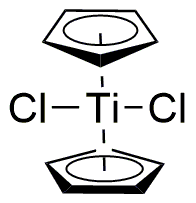Bis(cyclopentadienyl)titanium(IV) dichloride is widely utilized in research focused on
- Catalysis: This compound serves as a catalyst in various organic reactions, particularly in the polymerization of olefins, enabling the production of high-performance polymers with tailored properties.
- Material Science: It is used in the synthesis of advanced materials, such as titanium-based nanocomposites, which are valued for their strength and lightweight characteristics in aerospace and automotive industries.
- Organic Synthesis: The compound plays a crucial role in the formation of complex organic molecules, making it essential for pharmaceutical research and development, where precision and efficiency are paramount.
- Surface Coatings: Its application in the formulation of specialty coatings enhances durability and resistance to environmental factors, benefiting industries like construction and automotive.
- Electronics: In the semiconductor industry, it is used in the deposition of titanium films, contributing to the fabrication of electronic components with improved conductivity and performance.
General Information
Properties
Safety and Regulations
Applications
Bis(cyclopentadienyl)titanium(IV) dichloride is widely utilized in research focused on
- Catalysis: This compound serves as a catalyst in various organic reactions, particularly in the polymerization of olefins, enabling the production of high-performance polymers with tailored properties.
- Material Science: It is used in the synthesis of advanced materials, such as titanium-based nanocomposites, which are valued for their strength and lightweight characteristics in aerospace and automotive industries.
- Organic Synthesis: The compound plays a crucial role in the formation of complex organic molecules, making it essential for pharmaceutical research and development, where precision and efficiency are paramount.
- Surface Coatings: Its application in the formulation of specialty coatings enhances durability and resistance to environmental factors, benefiting industries like construction and automotive.
- Electronics: In the semiconductor industry, it is used in the deposition of titanium films, contributing to the fabrication of electronic components with improved conductivity and performance.
Documents
Safety Data Sheets (SDS)
The SDS provides comprehensive safety information on handling, storage, and disposal of the product.
Product Specification (PS)
The PS provides a comprehensive breakdown of the product’s properties, including chemical composition, physical state, purity, and storage requirements. It also details acceptable quality ranges and the product's intended applications.
Certificates of Analysis (COA)
Search for Certificates of Analysis (COA) by entering the products Lot Number. Lot and Batch Numbers can be found on a product’s label following the words ‘Lot’ or ‘Batch’.
Numéro de catalogue
Numéro de lot/série
Certificates Of Origin (COO)
This COO confirms the country where the product was manufactured, and also details the materials and components used in it and whether it is derived from natural, synthetic, or other specific sources. This certificate may be required for customs, trade, and regulatory compliance.
Numéro de catalogue
Numéro de lot/série
Safety Data Sheets (SDS)
The SDS provides comprehensive safety information on handling, storage, and disposal of the product.
DownloadProduct Specification (PS)
The PS provides a comprehensive breakdown of the product’s properties, including chemical composition, physical state, purity, and storage requirements. It also details acceptable quality ranges and the product's intended applications.
DownloadCertificates of Analysis (COA)
Search for Certificates of Analysis (COA) by entering the products Lot Number. Lot and Batch Numbers can be found on a product’s label following the words ‘Lot’ or ‘Batch’.
Numéro de catalogue
Numéro de lot/série
Certificates Of Origin (COO)
This COO confirms the country where the product was manufactured, and also details the materials and components used in it and whether it is derived from natural, synthetic, or other specific sources. This certificate may be required for customs, trade, and regulatory compliance.


